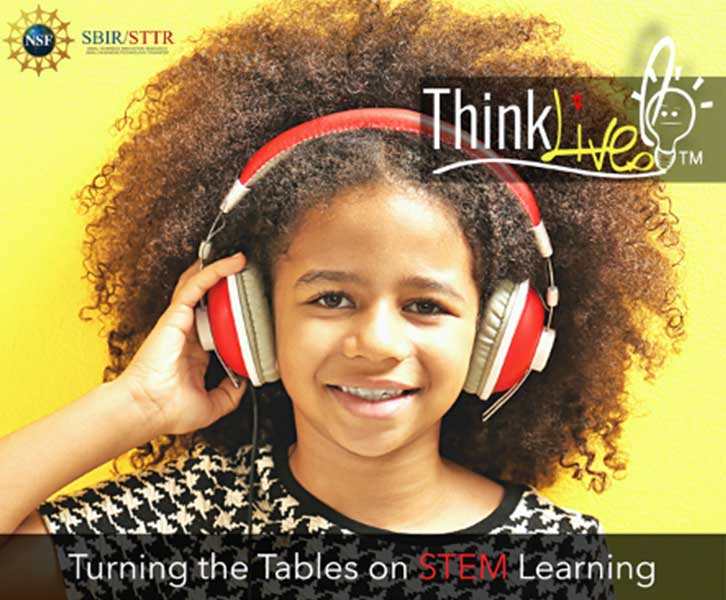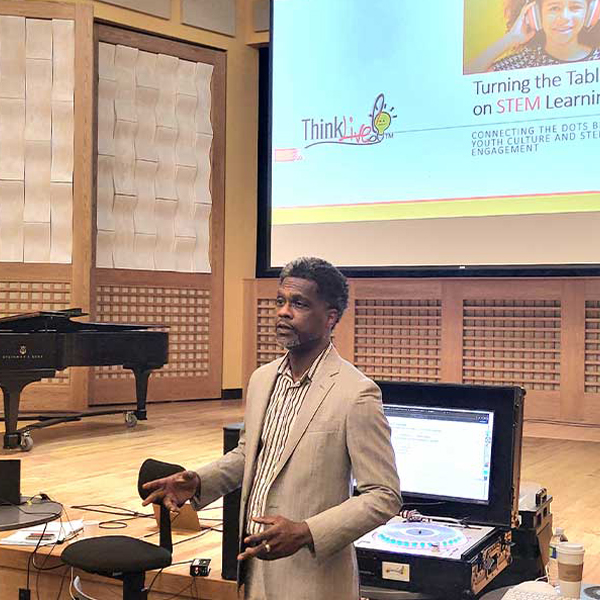In honor of Black History Month, the Georgia Tech Scheller College is celebrating our Black student and alumni entrepreneurs. We sat down with Evening MBA alum Charles Spencer to learn about his education technology company ThinkLive!
Music and STEM education have always been an integral part of Charles Spencer’s life. He began exploring music at a young age when he turned tables as a DJ at birthday parties. As his love for music grew, so did his appreciation for math and science. A graduate of the Frederick Douglass High School’s Engineering Magnet Program, the Decatur native credits the STEM classes he took for solidifying his affinity for the sciences.
When he was ready to launch his own company, he gravitated toward his passions — STEM education and music — and founded ThinkLive! Inc. in 2018. ThinkLive! Inc. uses DJ equipment and interactive strategies to enrich learning and engagement and help students excel in STEM classes.
“Our current solution excites students about STEM and also supports youth who are at a greater risk of failing to make academic progress,” said Spencer. “Self-motivation in learning is key and having solutions that resonate with young learners is vital. I believe the task is to accept students where they are, obtain their trust, and lead them to embrace STEM skills to guarantee a productive future.”

Spencer’s dedication to creating an impactful educational solution led to a recent $1 million NSF SBIR Phase II grant that has helped him build his vision. The grant sponsors the underlying technology the company uses and supports the creation of both in-person Turntable Lab and cloud-based virtual Turntable Playground programs.
Tell us about the roots of your entrepreneurial journey.
My entrepreneurial interests are influenced by early observations of my father launching and building his medical practice. The money I earned from DJing at birthday parties allowed me to invest in resources to secure more equipment and music as a fledgling entrepreneur. I believe my passion for the arts and sciences has been the launching point for a journey that has pivoted today to help students engage with and learn STEM through DJing.
What is one accomplishment you’ve had as an entrepreneur that means the most to you?
Earning the NSF SBIR Phase II grant for our company has been a huge accomplishment. This competitive grant has allowed our company to grow and pivot from a DJ hardware-focused company to an education technology company. This grant has allowed us to quickly innovate and surround our solutions with research-based technology.
 Our goal is to transition STEM learning from perceived (learning) risk to long-term resiliency. As technology developers, we understand what it takes to keep “eyeballs focused” in applications, from social media to short video apps. This innovative thinking needs to be a standard in the education of our young learners.
Our goal is to transition STEM learning from perceived (learning) risk to long-term resiliency. As technology developers, we understand what it takes to keep “eyeballs focused” in applications, from social media to short video apps. This innovative thinking needs to be a standard in the education of our young learners.
Creating innovations that impact how a young person prefers spending time, demonstrating competitiveness with products such as Tik Tok, and impacting the direction of a student’s STEM-relevant future has been one of my greatest accomplishments.
What does being a Black founder mean to you?
Being a Black founder — especially as we celebrate all of the untaught accomplishments of Black people during Black History Month — means being resilient. Being an educational technology entrepreneur and founder means understanding that African Americans represent a long legacy of innovators that helped build this country, though too few received credit for their successes. It means carrying the legacy of ancient African innovators that built the great pyramids and laid the foundation for math and science. It means being told “no” a thousand times despite your unique market perspective and demonstrating resistance and resiliency in moving forward.
In business, a unicorn describes a startup company with an ability to reach an extremely high return on investment. Unicorns look different and are outside of the norm. I implore all Black founders to understand your value and celebrate your genius even when some might not recognize a unicorn through narrow lenses. The good news is that more “gatekeepers” are discarding narrow lenses, and more Black and minority founders (and funders) are receiving and giving support.
What role did Scheller play in helping you become an entrepreneur and innovator?
Scheller has played a huge role in my growth as an entrepreneur. One of the most important roles has been my participation in the Georgia Tech network. It has provided me access to classmates, innovative engineers (over half of our employees are Georgia Tech graduates), and world-class professors. Scheller is located at the heart of an expanding technology hub and internalizing the “Ramblin’ Reck,” or Georgia Tech ethos, adds to that.
At Scheller, this ethos translated to developing an answer to a problem that could be better than the “standard” solution. This mindset coincides perfectly with the mindset of resiliency. You keep pushing forward but can quickly pivot to a potentially better solution. This happens when you recognize the opportunities that may present themselves, which I credit to my experiences at the Scheller.
